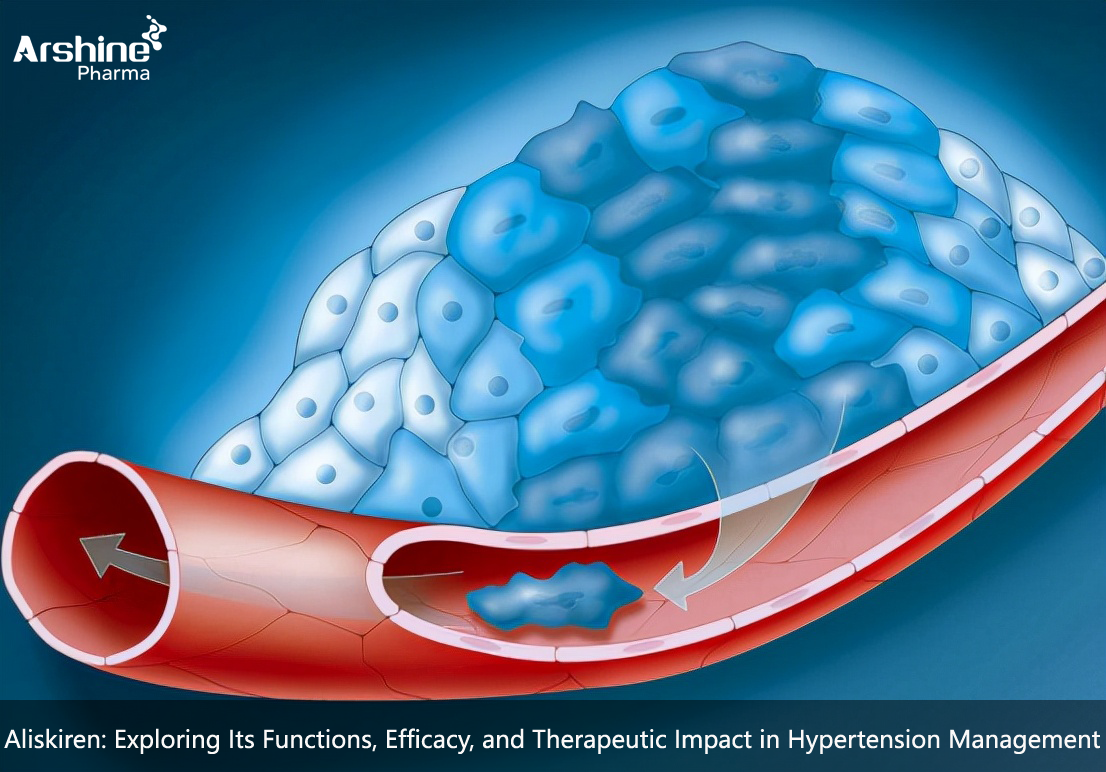
Introduction:
Aliskiren, a direct renin inhibitor, stands as a significant advancement in the management of hypertension, offering a unique mechanism of action and potential cardiovascular benefits. Renowned for its efficacy in lowering blood pressure and reducing cardiovascular risk, aliskiren has emerged as a valuable therapeutic option in the armamentarium against hypertension. This comprehensive exploration aims to unravel the functions, mechanisms of action, therapeutic uses, and efficacy of aliskiren in hypertension management.
Understanding Aliskiren:
Aliskiren, chemically known as (2S,4S,5S,7S)-5-amino-4-hydroxy-6-{2-(1H-tetrazol-5-yl)benzylamino}-2-isopropyl-7-{[(2-methylpropyl)oxy]methyl}-8-methyl-3,4-dihydro-2H-benzo[b][1,4]oxazine-3-carbonitrile, is a potent and selective renin inhibitor. It acts by directly binding to renin and inhibiting its enzymatic activity, thus blocking the conversion of angiotensinogen to angiotensin I and subsequently reducing the production of angiotensin II.
Functions and Mechanisms of Action:
1. Renin Inhibition: Aliskiren exerts its primary pharmacological action by inhibiting renin, the rate-limiting enzyme in the renin-angiotensin-aldosterone system (RAAS). By blocking renin activity, aliskiren reduces the formation of angiotensin I, subsequently lowering the levels of angiotensin II and aldosterone.
2. Angiotensin II Reduction: Decreased angiotensin II levels lead to vasodilation, decreased vascular resistance, and reduced aldosterone secretion, ultimately resulting in lowered blood pressure.
3. Sodium and Water Retention: Aliskiren's inhibition of aldosterone production decreases sodium and water retention, further contributing to its antihypertensive effects.
4. RAAS Suppression: By targeting renin, aliskiren suppresses the entire RAAS cascade, offering comprehensive inhibition of the angiotensin pathway compared to other RAAS inhibitors.
Efficacy in Hypertension Management:
1. Monotherapy: Aliskiren demonstrates efficacy as monotherapy in lowering blood pressure in patients with mild to moderate essential hypertension. Its long duration of action allows for once-daily dosing, enhancing patient compliance.
2. Combination Therapy: It is often used in combination with other antihypertensive agents, such as diuretics, calcium channel blockers, or angiotensin-converting enzyme (ACE) inhibitors, to achieve optimal blood pressure control, especially in patients with resistant hypertension or multiple comorbidities.
3. End-Organ Protection: Aliskiren may offer additional cardiovascular benefits beyond blood pressure reduction, including renal protection, reduction in left ventricular hypertrophy, and potential prevention of cardiovascular events in high-risk patients.
4. Renoprotective Effects: Its inhibition of the RAAS cascade may slow the progression of renal disease in patients with hypertension and chronic kidney disease (CKD), providing renoprotective benefits.
Therapeutic Considerations and Insights:
1. Dosage and Administration: Aliskiren is available in oral formulations, with dosages tailored to individual patient needs. It can be administered with or without food, and the dose may be adjusted based on blood pressure response.
2. Adverse Effects: Common side effects of aliskiren may include diarrhea, cough, hyperkalemia, dizziness, and fatigue. Renal function and serum potassium levels should be monitored regularly during treatment.
3. Drug Interactions: Aliskiren may interact with other medications that affect the RAAS, such as ACE inhibitors, angiotensin II receptor blockers (ARBs), and potassium-sparing diuretics, increasing the risk of hyperkalemia and renal dysfunction.
4. Contraindications: It is contraindicated in patients with a history of angioedema related to previous ACE inhibitor or ARB therapy, as well as in patients with severe renal impairment (eGFR <30 mL/min/1.73 m^2).
5. Pregnancy and Lactation: Aliskiren is contraindicated during pregnancy due to the risk of fetal injury or death. It should not be used in breastfeeding women.
Conclusion:
Aliskiren, as a direct renin inhibitor, offers a novel and effective approach to hypertension management by targeting the RAAS cascade at its inception. Its unique mechanism of action, antihypertensive efficacy, and potential cardiovascular benefits make it a valuable therapeutic option in the treatment of hypertension, especially in patients with resistant hypertension or those at high cardiovascular risk. However, careful consideration of dosage, monitoring for adverse effects, and individualized treatment approaches are essential for optimizing therapeutic outcomes. As ongoing research continues to unravel its mechanisms and potential applications, aliskiren remains a promising agent in the armamentarium against hypertension and associated cardiovascular diseases.
